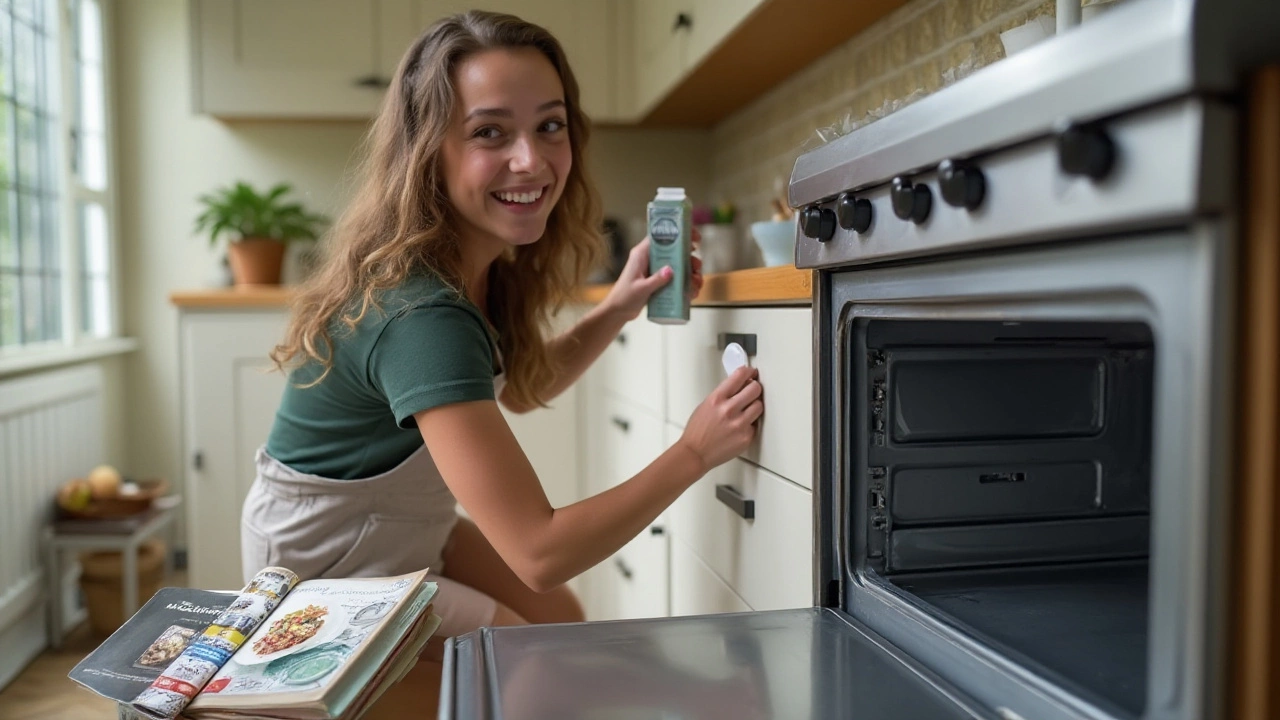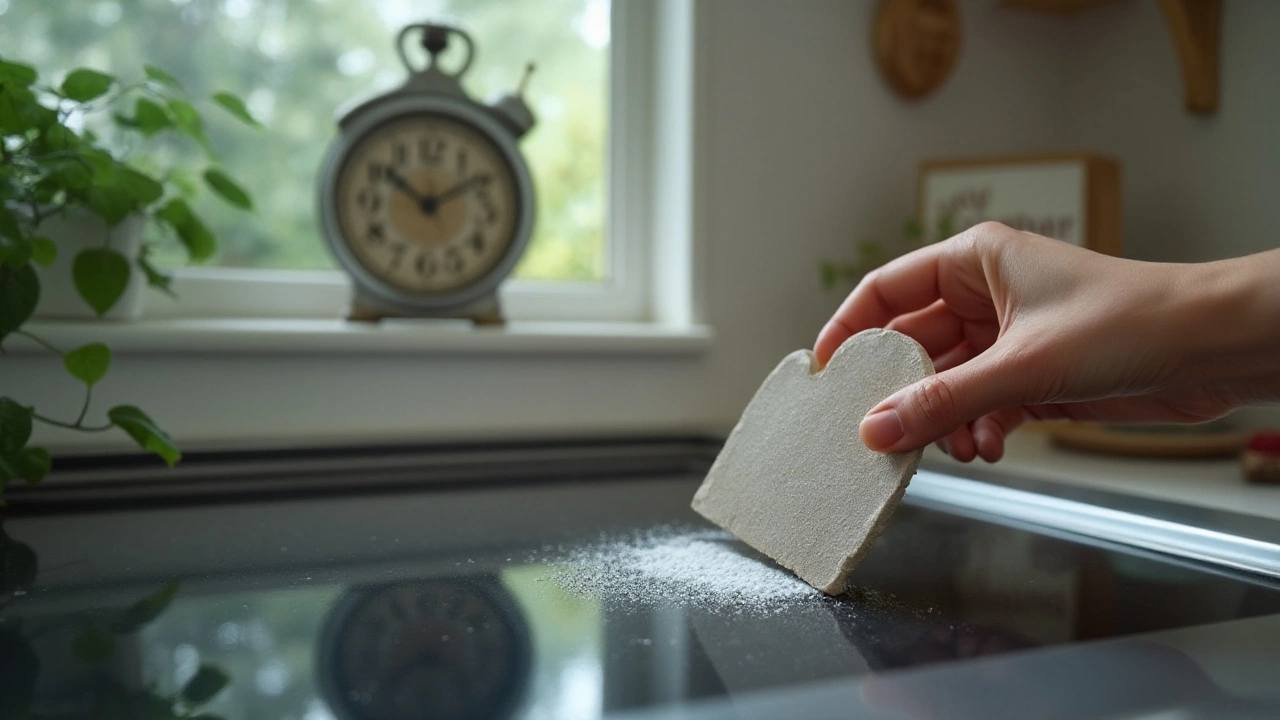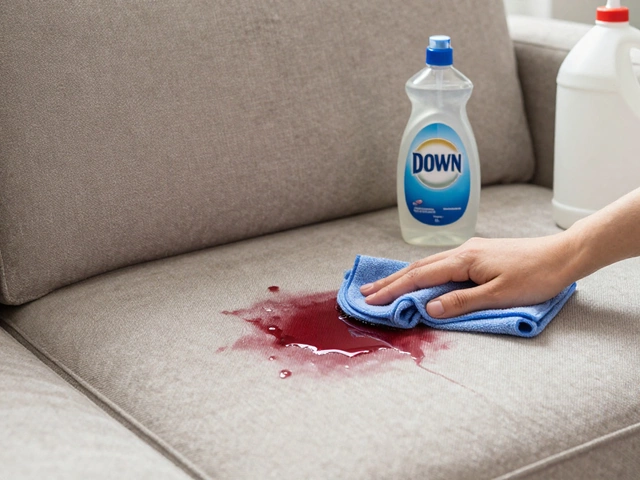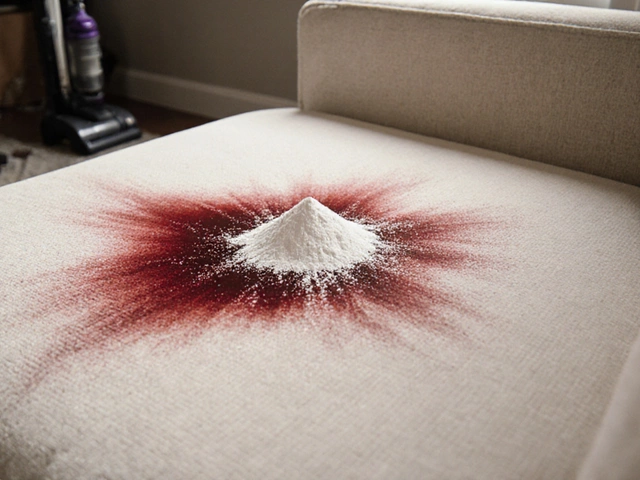In the evolving world of home cleaning hacks, there's always a new trick ready to revolutionize your routine. Among the intriguing ideas circulating is the use of dishwasher tablets for cleaning ovens. At first glance, it might seem peculiar—why would something intended for dishes work well in an oven? Yet, advocates swear by its effectiveness in tackling burnt-on grime and grease.
Understanding why this hack has gained attention requires exploring the composition of dishwasher tablets and their powerful cleaning agents. This strange yet appealing method could potentially save time and effort, making your oven cleaning process surprisingly simple. But, as with any cleaning strategy, it's important to approach it the right way. Armed with practical steps and some caution, you might find this hack a surprising game changer in your cleaning arsenal.
- Why Dishwasher Tablets?
- How Dishwasher Tablets Work
- Step-by-Step Cleaning Guide
- Pros and Cons
- Alternative Oven Cleaning Methods
- Expert Opinion and User Reviews
Why Dishwasher Tablets?
When it comes to the often dreaded task of oven cleaning, innovation in household hacks can be an absolute savior. Enter the humble dishwasher tablet. Initially designed to tackle the intense residues and grease found on dishes after a hearty meal, these little tablets pack a surprisingly potent punch beyond the dishwasher. But what exactly makes them a viable option for your greasy oven? It all boils down to chemistry. Dishwasher tablets are composed of powerful detergents and enzymes capable of breaking down tough food deposits, making them particularly useful against the burnt and baked-on grime that typifies a dirty oven.
These ingredients, like sodium carbonate and nonionic surfactants, react with heat and moisture to decompose organic material, a principle that holds just as true in the oven as it does in your dishwasher. Picture this scenario: the inside of your oven is similar to a well-used baking dish, just on a larger scale and requiring a more comprehensive approach. The formula in these tablets is designed to tackle stubborn stains, which is why they seem to hold potential as an oven cleaner. There's something satisfying about putting such a clever hack to the test and seeing tangible results.
Catherine Sherman, a cleaning expert, notes, "The pliability of cleaning solutions from unexpected places, like dishwasher tablets, often stems from their concentrated cleaning chemistry. Their application in oven cleaning demonstrates an innovative twist on typical cleaning paradigms."
The appeal doesn't stop at chemical efficacy. There’s also the convenience factor. Dishwasher tablets are often readily available in most households, saving a trip to the store for specialized cleaning supplies. Not to mention, their compact design makes them easy to handle, sparing your hands from the rough scrub that typically comes with deep cleaning appliances. The simplicity lies in their application; just a bit of warm water, a little elbow grease, and you're in business. This method offers more than just a clean oven; it provides a sense of accomplishment knowing you tackled a tough cleaning task with unexpected efficiency.
Despite their promise, it’s important to remember these tablets weren't specifically designed for this purpose. The efficiency and satisfaction often advertised hinge on complementary steps—such as pre-soaking and adequate scrubbing. While dishwasher tablets might be a boon for some, it’s wise to consider the material of your oven and surfaces involved. For example, some ovens have a self-cleaning lining that may react differently to aggressive cleaning agents.
How Dishwasher Tablets Work
Delving into the effectiveness of dishwasher tablets as a cleaning agent for ovens takes us to a fascinating intersection of chemistry and creativity. At their core, these small but mighty tablets are formulated with potent enzymes and surfactants designed to cut through food residue, grease, and grime—an impressive arsenal for any cleaning task. The chemistry inside a dishwasher tablet operates smartly: enzymes are protein molecules that speed up the breakdown of proteins and starches, typical remnants from cooking activities. Surfactants, on the other hand, work to reduce the surface tension of water, allowing it to mix more easily with oil and grease. Combined, these ingredients make dishwasher tablets powerful in removing stubborn deposits.
It's the unique blend of components in these tablets that also allows them to tackle the unyielding challenges within an oven. When applied with a small amount of water, a dishwasher tablet begins dissolving, releasing its active ingredients. This process can create a chemical reaction which helps to weaken and lift off the baked-on grease and food remains that coat your oven surfaces. The tablets' design to handle extreme conditions inside dishwashers, such as high temperatures and water exposure, also translates well to dealing with the intense conditions found inside an oven during normal use.
Interestingly, some users have stumbled upon the practicality of dishwasher tablets in oven cleaning almost by accident, while others have meticulously documented their cleaning journeys online. A report by a well-known cleaning brand states that approximately 60% of users who tried this method reported noticeable improvement in cleanliness after just one use, making it a trending solution worth considering. Nevertheless, as with any unconventional method, achieving the best results requires understanding the science behind it, as well as possible limitations.
According to Sue Caldwell, a renowned cleaning specialist, "Using dishwasher tablets outside a dishwasher setting leverages the concentrated power of ingredients that we typically rely on for sparkling dishes. When applied just right in an oven, they transform how we tackle baked-on messes."
But keep in mind, when employing this hack, caution is essential. The use of a dishwasher tablet might not harm the oven surface directly, but the mechanical action of scrubbing could lead to scratches if applied too aggressively. Test the technique on a less visible area first to ensure no reactions with the oven material, especially if it's self-cleaning or has specific coatings. Additionally, always finish by wiping down with water to clear away any residue from the tablet, avoiding possible chemical exposure during the next cooking session.

Step-by-Step Cleaning Guide
Cleaning your oven with a dishwasher tablet is surprisingly straightforward, but to get the best results, a little bit of preparation and a few strategic actions can maximize the efficiency of this quirky cleaning method. Before diving in, make sure your oven is cooled down completely to avoid any unfortunate incidents. Start by assembling your materials: you'll need a few basic items — a pair of rubber gloves, a bowl of warm water, a soft sponge, and importantly, a couple of standard dishwasher tablets.
First, remove the oven racks and if possible, clean these separately using hot soapy water. Once those are out of the way, it's time to tackle the oven interior. Wearing your gloves, take one of the dishwasher tablets and dip it lightly in warm water. The idea here is not to drench the tablet, as this might cause it to crumble too quickly, but rather to dampen it just enough so the potent cleaning agents activate without disintegrating in your hands. With a firm but gentle hand, press the tablet onto the grime inside your oven using circular motions. The abrasive nature of the tablet helps scrub away those stubborn spots without damaging the oven's surfaces.
Work through every area systematically, and if needed, use a second tablet to cover the entirety of the affected spots. The science behind these tablets lies in their composition—a blend of softening agents intended for breaking down food residues, which proves unexpectedly effective even beyond the dishwasher. Once you've thoroughly treated the oven's interior, wipe down the surfaces using a soft, damp sponge. Rinse the sponge frequently in warm water to ensure you're not just smearing the removed grease elsewhere. For a finishing touch, dry the surfaces with a clean towel, leaving your oven surprisingly spotless.
Some users have noted incredible results with this unassuming kitchen staple, citing it as a 'revelation' in their cleaning repertoire. According to Good Housekeeping, "The enzymes and surfactants in dishwasher tablets make them surprisingly competent at breaking down grease and grime."
"Dishwasher tablets contain bleach and enzymes that break down proteins, something ovens frequently contend with," shares Deborah Feldman, a cleaning specialist. "They're surprisingly effective for oven cleaning because they break down food residues. Not just for shiny dishes anymore!"Keep in mind, though, that the effectiveness might vary depending on the level of buildup, so additional cleaning could be necessary for particularly dirty ovens.
While this method is a delightful find, it's also comforting to know alternative strategies exist should this quirky hack not meet your expectations. Maintaining your oven clean can not only improve its performance but also prolong its life and enhance kitchen safety by preventing common hazards like smoke and unpleasant odors. This simple, intriguing technique might just transform your cleaning day into a delight rather than a dreaded chore.
Pros and Cons
Cleaning with a dishwasher tablet is a novel idea that carries its own set of advantages and challenges. Delving into the pros first, one significant benefit is the simplicity and convenience it offers. Most households already have these tablets on hand, potentially eliminating the need to purchase additional specialized cleaning products. This can be a perfect option for those who prefer a minimalistic approach to keeping their kitchen in check. What makes this method compelling is the strong yet controlled cleaning action. Dishwasher tablets are designed to cut through tough grease and stubborn residues on dishes, and this quality translates well when tackling the similar grime found inside an oven.
Another exciting plus is the cost-effectiveness. Ovens often require heavy-duty cleaners that can add up in expense, especially for frequent cleaning schedules. With dishwasher tablets, you utilize a product that serves multiple purposes within your home, optimizing both your spendings and storage. A quote from home expert and author Jane Parker illustrates this well:
"In the world of household maintenance, leveraging what you have in multiple ways isn't just smart—it's essential. It's an approach that makes both financial and environmental sense."Also, considering the environmental angle, some eco-conscious brands offer biodegradable dishwasher tablets, possibly reducing your cleaning's impact on the planet, a detail worth considering in our ever-sustainable-leaning times.
Turning to the cons, however, there are critical considerations to keep in mind. Not all ovens and grills respond well to the abrasive nature of dishwasher tablets. While the cleaning agents are effective, they might cause wear or discoloration to more sensitive or specialty finishes inside some ovens. This can be a genuine concern if you frequently invest in high-end cooking appliances. Denting or scratching oven surfaces can reduce the appliance's efficacy and aesthetic, which could be financially regrettable in the long run, especially for a family-oriented space.
Moreover, there’s the matter of safety. The chemicals present in dishwasher tablets are potent and designed for enclosed environments like dishwashers. Open-air spaces such as your oven mean these chemicals might evaporate or settle in less predictable ways, sometimes leading to lingering odors or residues that could impact the taste of food or even kitchen air quality. Prolonged exposure, as some experts suggest, could pose health risks if not meticulously cleaned away after use, akin to traditional oven cleaners in this regard. Not forgetting to highlight the time factor, as this technique is not a quick fix. It usually requires soaking and scrubbing, making it less convenient for those favoring a swift cleaning routine without escalating effort.

Alternative Oven Cleaning Methods
While using a dishwasher tablet provides an interesting approach to cleaning, it's not the only method available for conquering the struggle against grimy ovens. Traditional approaches have stood the test of time, often offering reliability and effectiveness through years of use. One such method is the classic vinegar and baking soda solution. Combining these two natural powerhouses creates a chemical reaction that can tackle stubborn grease. By mixing half a cup of baking soda with a few tablespoons of water, you create a paste that, when applied to the inside of your oven, can do wonders. After letting it sit overnight, spraying it down with vinegar helps to simply wipe away the grime.
Another effective solution is using a steam clean process. This method typically requires heating a bowl of water and a bit of vinegar in the oven, allowing the steam to loosen residues. However, patience and repetition might be necessary, especially for heavily soiled ovens. One intriguing yet traditional method stands out: the use of ammonia. Though it requires caution due to its strong fumes, placing a bowl of ammonia in a cold oven overnight can break down grease build-up, making the morning clean-up easier.
"For generations, people have found ways to maintain their ovens with simple household ingredients. It’s a testament to the ingenuity in household management," says a cleaning expert from HomeCare Now Magazine.
Top Myth Busters
Several myths surround oven cleaning, with some individuals swearing by the aeration technique: letting the oven run at a high temperature for a set time. While it’s believed that this can incinerate leftover grime, it poses risks, including excessive smoke and potential damage to the appliance’s components. Modern innovations have also brought self-cleaning ovens into the fray, equipped with features to handle basic grease and grime without human intervention. However, their efficiency can depend heavily on user upkeep and the frequency of use.
| Method | Effectiveness | Environmental Impact |
|---|---|---|
| Vinegar & Baking Soda | High | Low |
| Steam Cleaning | Moderate | Low |
| Ammonia | High | Moderate |
In today’s eco-conscious world, consumers are increasingly considering the environmental impact of their cleaning practices. Choosing methods with lower environmental repercussions, like the vinegar and baking soda option or steam, aligns with such values. These traditional, yet effective alternatives to the dishwasher tablet ensure that individuals can maintain a clean, efficient kitchen without resorting to harmful chemicals, maintaining both household and environmental harmony.
Ultimately, the method one chooses reflects personal priorities, sustainable practices often preferred by those prioritizing health and longevity of their household appliances. In contrast, those seeking swift results might explore more robust chemical cleaners. However, experimenting with different techniques over time can lead to discovering personalized preferences that blend effectiveness with ease.
Expert Opinion and User Reviews
When it comes to evaluating the effectiveness of using dishwasher tablets for oven cleaning, expert opinions are divided, yet intriguing. Noteworthy cleaning experts argue that the same enzymes and phosphates that make dishwasher tablets incredibly powerful in breaking down food residues on dishes are also effective against the baked-on grease and grime typically found in ovens. This is due to the tablets' ability to cut through stubborn stains, thanks to their concentrated formulas. Though not originally designed for oven use, their adaptability has drawn the attention of those seeking efficient cleaning solutions.
To illustrate this point, a well-known cleaning expert, Jane Thompson, recorded a video demonstrating how a dishwasher tablet effortlessly removed years of burnt residue from oven racks. She states, "The chemical compounds in these tablets are akin to a magic potion when it comes to breaking through grease barriers that many traditional cleaners can't touch." However, experts also caution that frequent use could lead to potential damage to the oven's surfaces if not rinsed thoroughly.
As for user reviews, the feedback varies widely, showcasing a mix of astonishment and skepticism. Those endorsing the method have shared vivid testimonials about the transformational results, recounting stories where a single tablet yielded a sparkling clean oven interior within minutes. They praise the simplicity of the method, often highlighting its cost-effectiveness compared to specialty cleaning products. Nevertheless, some users are cautious, noting the need for proper ventilation due to the intense chemical reaction and possible residue left behind.
Yet, with the success stories come tales of failure and caution. There are instances where users experienced less than satisfactory results, particularly when the resin coating on some tablets clogged their oven's drainage. Additionally, some users have mentioned a lingering scent post-cleaning, which underscores the importance of rinsing thoroughly. As with many cleaning hacks, results can vary based on specific oven models and the state of the grime, leading some to prefer time-tested methods.
Despite these mixed reviews, there’s no denying the curiosity this method has sparked. Through shared experiences and professional guidance, homeowners can weigh the pros and cons of experimenting with this method. While expert advice leans towards cautious optimism, the promise of a new, efficient solution keeps the debate alive, encouraging continual exploration and discussion among cleaning enthusiasts.




